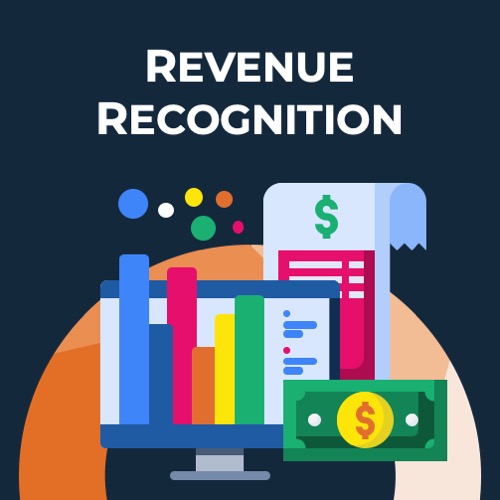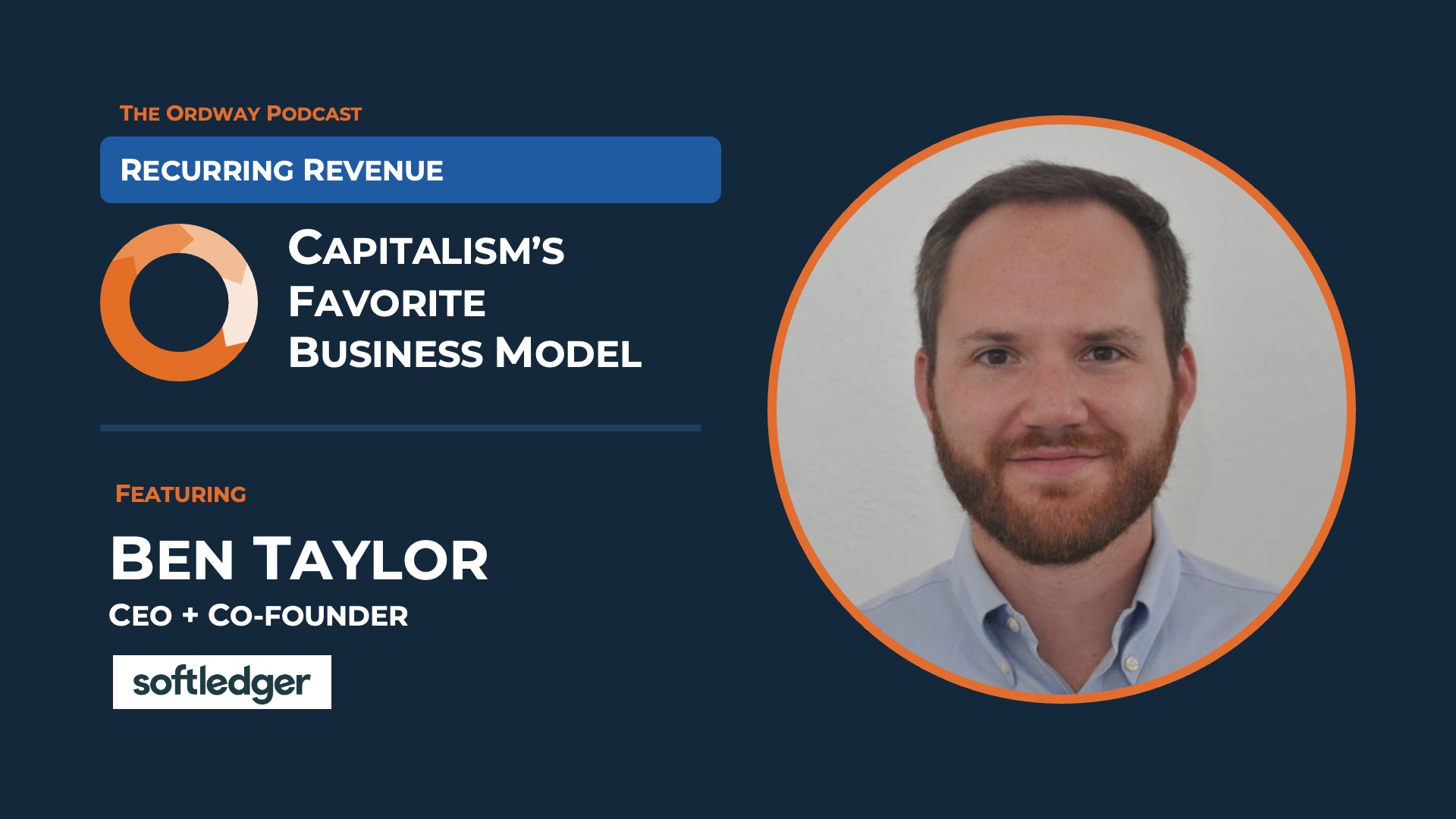
The Ordway Podcast: Capitalism’s Favorite Business Model
SoftLedger and Next Generation ERP
Ben Taylor, CEO and Co-Founder of SoftLedger and former accounting manager shares his views on the top challenges finance departments face in getting real-time data from their ERP systems.
Episode Summary
Ben Taylor explains the vision behind SoftLedger’s next-generation accounting platform and the advantages his new architecture provides with tackling complexities like multi-entity consolidation and foreign currency management.
In the second half of the episode, Ben shares his lessons learned as a CEO and co-founder on topics ranging from culture and talent acquisition to go-to-market and product-led growth. He also explains SoftLedger’s innovative indirect model that enables other software vendors to access accounting features as-a-service with the company’s API suite.
Transcript
Steve Keifer
Hello and welcome to the Ordway podcast where we talk about recurring revenue, which is capitalism’s favorite business model. My name is Steve Keifer, I’m the chief marketing officer here at Ordway and I’d like to welcome our featured guest today who is Ben Taylor, the CEO and co-founder of Softledger. Welcome Ben.
Ben Taylor
Thanks Steve appreciate you have me on
Share the origin story and vision for SoftLedger
Steve Keifer
Yeah, thanks for making the time. I thought you’d be a really interesting guest on the show. We wanted to talk about two things. One, Softledger is doing some really interesting things in the accounting and fintech space. So I wanted to hear a little bit about the product, but also want to get your perspective as a founder and CEO of a growing SaaS business. There’s always lots of lessons learned from that. So why don’t we start off though, tell us a little bit about Softledger. I mean, there’s lots of accounting software out in the market.
Ordway is in kind of in a similar space, but not competitive with what you guys, you know, what was the big problem that you guys were looking to solve? What inspired you to found the company?
Ben Taylor
Sure. Yes. So a little bit about SoftLedger. We’re a software provider. We provide accounting software and APIs for companies with multiple entities, multiple currencies, and any with digital assets as well. We sell directly to CFOs and controllers. Kind of like in between a bookkeeping software like QuickBooks and.
The next step up like a NetSuite, we kind of provide an easier path off that you could use with a smaller team. And then we also sell indirectly through technology partners that an example being you could have a vertical software provider that’s an operation system for a particular industry. It touches accounting. Maybe they’ve even built some accounting functionality. We help them build and maintain that accounting functionality.
Just do that quicker, more cost effectively all that. And so kind of there’s, there’s two paths to market there. Quick, you know, story on how we started is my background is in accounting. I was working at the, in the accounting department for a public company, and it just took too long to get the financial statements every month. I like to say we didn’t know how we were doing on January fifth until February 28th.
So it always took so long to get there. So I figured this could be solved with software and called up my longtime friend, Goeff Ostriga. He’s a computer science background, the same way I have an accounting background. We’ve known each other for a long time since freshman year at college at University of Maryland. And we just took a crack at building this, this system.
It’s been February 2017 is when we went full-time. We were nights and weekends for a bit prior and fast forward to today. We’re serving over 70 customers all over the world and yeah, pretty much brings us the date.
Key product capabilities of SoftLedger
Steve Keifer
That’s great. So six years in. So I want to dive a little deeper on the product because you said a couple things there that were really interesting. You were mentioning, you know, not having to wait until the end of the month, you know, in January. You had to wait until a couple of days into February to get visibility on the financials. You also mentioned those APIs and things, but maybe we take a step back. Just, you know, what’s differentiated about the product? What’s kind of the secret sauce or the things that you guys do differently that perhaps nobody else does?
Ben Taylor
So the API-focused aspect is important. It’s all about getting financial data faster to the people that need it within an organization. And so direct, indirect, it’s all about that, using modern software and APIs to do that. And so that’s really our differentiator across the board.
Key pieces of functionality jump out as multi-entity consolidation, foreign currency management, and then digital asset management as well. So those are just three functional areas that we see a lot of because we’re strong in those areas. And industry-wise, it’s kind of across the board though. Investment management, financial services, and software are the top three for us.
Can you tell us about the go-to-market strategy SoftLedger is using?
Steve Keifer
I was going to ask a little more about that go-to-market. So those are the three industries, small business, mid-market, enterprise, any more product-led growth, sales-led growth. Tell us a little more about just the go-to market.
Ben Taylor
We’ve got the product-led growth aspects that help us operate efficiently and have our customers use the system easily. It doesn’t, you know, the training is a lot less than it would need to be with a, with legacy systems. So there’s those aspects to it. Still, this is a core business system. We can’t just, you know, self-service it and help, you know, have people go off to the races. So it’s somewhere in between. But
Primarily our ideal customer is a CFO controller at a 50 to 200 employee company. Could be a bit bigger, could be a bit smaller, depending on the complexity. And then that’s on the direct side. And on the indirect side, we’re selling to a software company that serves that ICP or smaller or bigger, depending, because we’re working with a partner, it can, we can do, there’s more flexibility there.
What are some of the unique aspects of the culture at SoftLedger?
Steve Keifer
There’s quite a few companies that fall in that 50 to 200 employee range, both on the software side or side in your direct side. So it sounds like a nice niche to play in.
Tell us a little bit about the culture and talent. Are you guys remote? Are you in the office? Are you a combination of both?
Ben Taylor
So we’ve been remote from day one really. When it was just Geoff and I, we, yeah, well, I had a necessity to start because we couldn’t forward an office. And we even early on wanted to make ourselves look bigger than we were. And so we wouldn’t be in an office and that was kind of a problem. And then, you know, all of a sudden everyone was remote and was totally fine. So it just kind of was something we were doing already. And so we, yeah, being remote is really core to our
Steve Keifer
You were ahead of the curve.
Ben Taylor
you know, how we’ve run the company and our culture and everything. And it’s been, it’s been great. There’s I very much missed going to the office. There are a lot of benefits that are, that are difficult or impossible to replicate, uh, as a, as a remote team, but the benefits just far outweigh that. Yeah, it’s been good for us.
Steve Keifer
Anything else interesting about the culture, like in terms of how you’re getting top talent, you know, everybody’s competing for developers and good, you know, SEO and marketing, go to market people.
Ben Taylor
Well, the flexibility that provides the ability to directly contribute to our product, I think this is something that’s really attractive. There’s plenty of times even in the past couple of weeks where it’s like some customer request has come up, we’ve digested it, looked at whether we can get this in our product roadmap and we just put it in the next sprint and it’s like from ideation to it being in the product is like a couple of weeks.
Doesn’t happen often, it’s got to be an easy enough one to do, but you’re right there at that point where you can really impact the product and the company. And so I think that that’s been attractive to people.
Steve Keifer
Yeah, no, it resonates with me. That’s one of the things I like about being in Orderway is just every employee is a big impact and you get stuff done fast. So six years in, 70 customers. I’m sure you have ambitions of getting a lot bigger, but still there’s a lot of startups that don’t make it anywhere close to that. What would your advice be to other founders that may be a couple of years behind you? Any thoughts on?
What are some of the unique aspects of the culture at SoftLedger?
Steve Keifer
Any thoughts on raising capital or hiring? Hiring mistakes you made? Go to market? Building the product? Any words of wisdom for others that are following in your footsteps?
Ben Taylor
The way we grew is I got a lot of advice of throughout the years from a lot of people, specialists in their particular industries, other startup founders, other executives at early stage companies that had done it a number of times. And I’d say it’s easy, especially early on to hear a piece of advice and go, oh, I’m doing this all wrong or this person knows better than me. And I think that it’s possible, that’s the case. It would be improbable in some situations, especially as you’ve gotten started. And they, there might be a lot more experience with, uh, there, but you’re always in the position to make the best decision. Like there’s no, there’s no one in a better position to make the right decision than you in the thick of it. And so just, that’s all just information and more information never hurts. Just get good at synthesizing and like getting the, you know, figuring out what that means to you and what the next decision is. And then if you do that, you know, there’s a lot of people that are willing to share and help and then, yeah, over time, things, you know, you’re going to a big enough market, you know it well enough, you’re really hitting on a big problem. I like to say this quote, I think it’s Warren Buffett, it’s, in the short term, markets are voting machines, in the long term, they’re weighing machines. And I think that applies to a lot of things. It’s just over time.
If there’s something there, that will become evident and you’ll grow.
Steve Keifer
Good stuff. Yeah, I’m on my third startup peer in a row, and I found the same thing. Lots of advice, but I found there’s sort of like these macro things that apply to every SaaS company, but then there’s a lot of what I call microeconomics that are specific to your business, and nobody’s better positioned than the team that’s on the ground to make those calls.
What are some of the unique aspects of the culture at SoftLedger?
Ben Taylor
If anyone listening, if it sounds like we’re hitting on the nail on the head for anything, we can, we’re easy to find. Please reach out. But yeah, thanks again for having me on. This is great.
Steve Keifer
Yeah, I think you’re onto something big. There’s definitely, from my perspective, a need for alternatives and making that jump to QuickBooks to NetSuite. And also this idea of consuming API functionality via an API, or accounting functionality via API is really intriguing. So we’ll be interested to watch you guys grow here over the next couple of years. Thanks again for taking the time and thanks everyone in the audience for tuning in. We look forward to seeing you again on a future edition of the Ordway podcast where we talk about capitalism’s favorite business model – recurring revenue.
Recent Blog Posts







